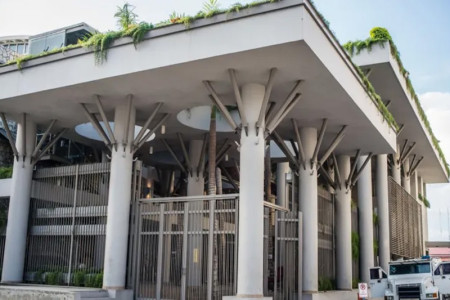A "group of criminals" targeted the Bank of the Republic of Haiti (BRH) on Monday, an employee told AFP, leaving up to four dead and a guard injured.
The bank itself thanked security forces for "protecting our community".
Haiti has been rocked by weeks of violence after gangs raided prisons, released thousands of inmates and forced the prime minister to resign.
In a statement on X, BRH said: "Following an incident yesterday near [our] site on Rue Pavee, security forces and the bank's security team acted with professionalism and efficiency."
The bank is one of a few key institutions still running in Haiti's capital Port-au-Prince.
BRH added that it was "deeply grateful to our officers and the state police for their vigilance".
The employee, who spoke to AFP on the condition of anonymity, said "three or four" of the criminal gang had been killed in the attack.
They also told the news agency that the injured guard had sustained gunshot wounds.
BBC News was not able to independently verify these claims.
Police have been trying to recapture areas of Port-au-Prince held by notorious gang leader Jimmy Chérizier, nicknamed "Barbecue".
The power struggle has led to an uptick in violence - including gun fights - on the streets of Haiti, a country which struggled with gang violence long before the recent crisis.
Haitians told the BBC they could see no end to what is happening in the Caribbean country, with Port-au-Prince and the surrounding region under a month-long state of emergency.
Last week, following mounting pressure, Ariel Henry agreed to step aside as prime minister to allow the formation of an interim government.
Mr Henry had not been allowed back into Haiti after leaving in late January for visits to Guyana and Kenya, where he had signed a deal on the deployment of an international security force to help tackle the violence.
How gangs came to dominate Haiti
The Caricom group of Caribbean nations subsequently outlined plans to set up a transitional presidential council, comprising - among others - seven voting members, two observers and a religious leader.
One of those put forward to be a member was Leslie Voltaire, a government minister under former Haitian President Jean Bertrand Aristide.
He told BBC World Service's Newshour programme that Haiti was in "a grave crisis" - but refused to accept that "bandits" could one day rule the country.
"They [armed gangs] say that they have put Ariel Henry out, but they cannot enter into the palace, they cannot enter into the prime minister's office," Mr Voltaire said.
Describing the chaos, he said "something" had to be done - and fast - "because now all the ports are blocked, the airport is blocked, and even if you want to go to the beach you cannot go".
He continued: "There is a lot of kidnappings, a lot of rape, a lot of burglaries. One has to decide if you want to live like that, or if you want to fight. I want to fight."
Countries including the United States and Germany last week evacuated embassy staff from Port-au-Prince, with the violence showing no sign of easing.
The US State Department then said over the weekend that it planned to charter a flight to rescue its remaining citizens still stranded.


